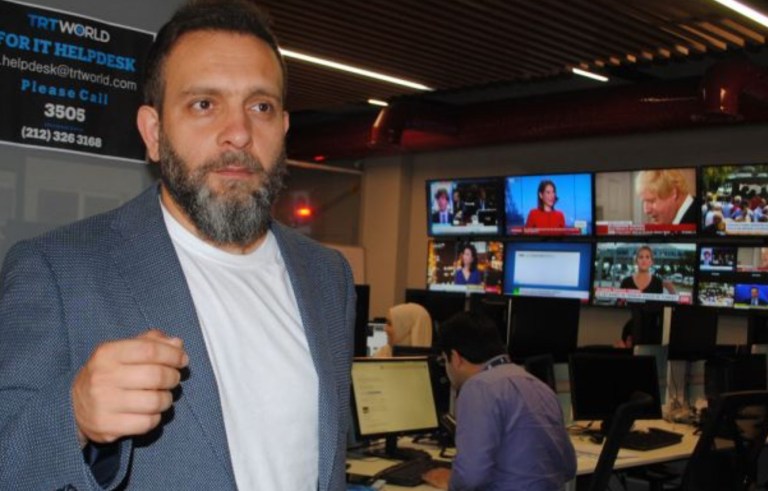Secret court and police documents obtained by Nordic Monitor have revealed that the director of TRT World, the English news channel of Turkey’s state broadcaster, was investigated as a suspect in a probe of Islamic Revolutionary Guard Corps (IRGC) Quds Force operatives and assets in Turkey.
The documents, classified as secret, detail multiple wiretap warrants issued for Fatih Er, TRT World news director and former bureau chief for TRT in Jerusalem, by Turkish courts that were overseeing counterterrorism cases in Turkey.
The first warrant was granted by judge Süleyman Karaçöl of the Istanbul 2nd High Criminal Court on March 1, 2013 after a request filed by the special counterterrorism section of the Istanbul Chief Public Prosecutor’s Office.
The warrant authorized the investigators to monitor not only Er’s phone conversations but also his Gmail account in order to decode the IRGC network, operating under the Turkish name Tevhid Selam. The warrant was reauthorized six times based on new leads the police discovered from the intercepted communications. The wiretaps reveal the suspects were concerned about the exposure of their past dealings in Syria and did their utmost to keep them secret.
Judge’s order to wiretap the phone of Fatih Er, who was named as a suspect in the IRGC Quds Force probe:
Er has also been involved as an activist with radical Turkish charity group the Foundation for Human Rights and Freedoms and Humanitarian Relief (İnsan Hak ve Hürriyetleri ve İnsani Yardım Vakfı, or IHH). The IHH works closely with Turkish intelligence agency MIT, and its president, Bülent Yıldırım, has met with senior IRGC Quds Force operatives according to the investigation file.
In a wiretap dated June 1, 2013, Er was recorded as talking to Mehmet Akif Ersoy, the former TRT bureau chief in Cairo who had been trained in Shiite study circles in Syria, and stating that he was marching in an IHH rally in Istanbul. Ersoy was also target of the investigation. In the conversation Er names some reporters working for TRT and threatened them with dismissal because of their critical stance on the anti-government Gezi protests in the summer of 2013.

In addition to Er, Sefer Turan, Erdoğan’s chief foreign policy advisor for Muslim and Arab states, and Mustafa Varank, a former chief advisor who is now minister of industry and technology, were also wiretapped by investigators who suspected the two had been working secretly to promote the interests of the Quds Force in Turkey.
Transcript of one of the many wiretaps obtained from the phone conversations of suspect Fatih Er:
The investigation was unfortunately hushed up by Erdoğan after the executive branch was illegally tipped off about the secret probe being conducted by judicial authorities. However, the probe identified many Iranian and Turkish nationals as Quds Force operatives and associates. Some of the people on the list had served time in Turkish prisons in the past on Iran-linked terrorism charges and were reactivated by the Quds Force after they were released by an amnesty bill endorsed by the Erdoğan government in 2004. Some of the operatives were found to be involved in surveillance of the US and Israeli embassies and consulates in Turkey, had collected information about NATO military installations and received military training in Iran.
In January 2014 the government, already shaken by December 2013 corruption investigations that incriminated the inner circle and family members of then-Prime Minister Erdoğan, was in a panic and scrambled to kill the IRGC Quds Force investigation. In a serious blow to the independence of the judiciary by the blatant interference of the executive branch, Erdoğan and his associates orchestrated the removal of the lead prosecutor and all the police investigators who had worked on the Quds Force investigation.

A few months later, the new prosecutor, Irfan Fidan, a pro-Iran Islamist, took over the investigation, dropped the probe, closed the case and let all the suspects off the hook. The Iranian spies were allowed to escape. Instead, the prosecutors and police chiefs who had investigated the Quds Force for years as well as the judges who authorized warrants such as wiretaps and surveillance were subsequently charged in sham judicial investigations with attempting to overthrow the government.
Later on, an indictment was filed for all prosecutors, judges and police investigators who were involved in the Quds Force terrorism investigation as well as journalists who reported on the clandestine activities of the IRGC in Turkey. Many have been jailed pending trial since 2015. Prosecutor Fidan, Erdoğan’s special appointee, dismissed all the evidence collected against Quds Force operatives, fabricating new charges against those who merely did their job in the law enforcement agencies and criminal justice system.
The investigators claimed that Fatih Er and his group were trained in Syria’s Shiite religious schools linked to Iran:
























